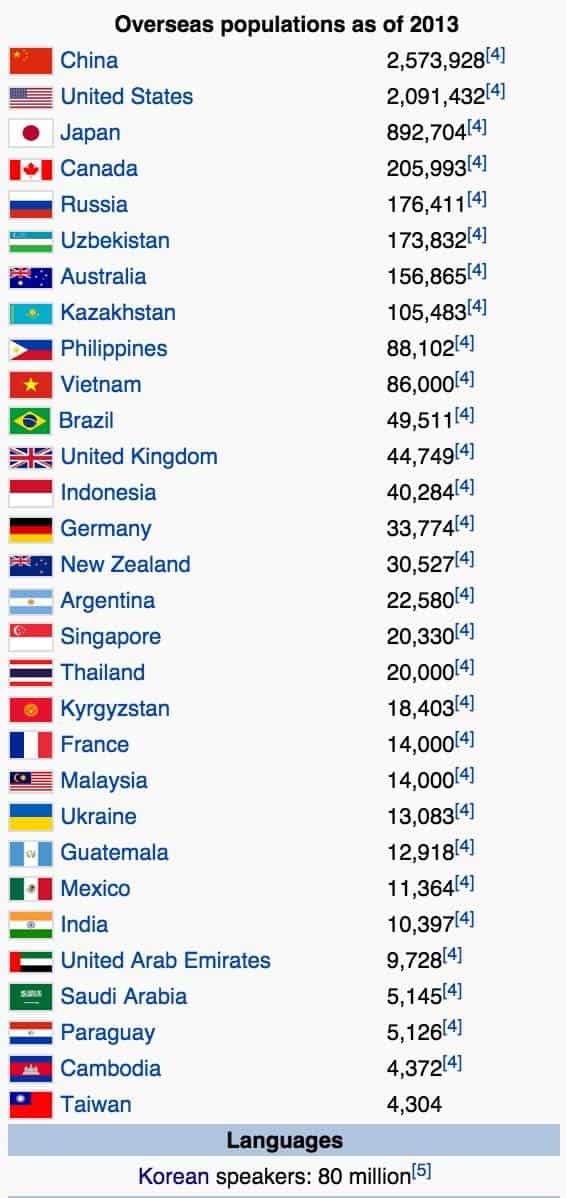Whether you’re thinking of coming to Korea, on your way to Korea, or you’ve lived here for years, the question frequently comes up: Should I study Korean in Korea?
Great question!
This commonly comes up among people who will be living in Korea as some point. The thing is, the answer is different for everyone.
To help solve this mystery, first we will answer the top ten common questions that come up.
Then, we will let YOU be the judge. Let’s get to it!
1. Do I Need to Study Korean in Korea?
You can get by in Korea as an English speaker and never learn Korean. Plenty of people have done it and have lived in Korea for many years.
Rest assured, you likely won’t starve or get stranded. Whew!
It more accurately comes down to how many inconveniences you’re willing to tolerate.
Most people want to have a certain quality of life or type of experience in Korea. So to answer this question more accurately, you need to factor in three main things:
- Where you live
- Why you’re in Korea
- What kind of experiences you want
If you live in a big city such as Seoul or Busan, there will be more English speakers than in the countryside. On the whole, people in these areas can communicate in English better, even if it’s limited.
If you live in a smaller city, knowing at least basic Korean phrases will help tremendously.
Next, you need to decide why you’re in Korea. Is it only for a few months to work on a research paper, where you interact with very few people while living in Itaewon (the international area of Seoul)? Or will you be making the rounds in the city, shopping online, and taking trips on weekends? Your reasons why you’re in Korea will help you decide how much you’ll actually need to be studying Korean.
Lastly, you need to think about what kind of experience you want while you’re here. Think about a time in your future, about your final days in Korea. Maybe this is 20 days or 20 years from now. What kind of experiences did you want to have? Did you want to interact with Koreans, be a great tour guide when friends and family visit, and order like a pro at the cafe? Or were you happy living a Westernized version of the Korean life?
There is no easy answer, it comes down to your own personal preferences. The main thing you want to avoid is looking back with regret. Going into the future and looking back on today will help you understand how you feel about this point.
2. Do I Need to Study Korean Before Coming to Korea?
No, but it sure helps!
There is no question that learning Korean in Korea makes it easier than in your home country. You’re around the Korean language all day long, so even if you want to avoid it, you can’t. It’s great for keeping you immersed in studying, even when you don’t realize it!
This is especially fun once you learn to read Hangul (Korean alphabet). You’ll find yourself reading signs, menus, and advertisements everywhere you go.
If you plan to be at least conversational in Korean, it makes sense to learn the basics before you arrive in the “Land of the Morning Calm”. This includes Hangul, key phrases, basic grammar, and the most common vocabulary words. This can all be learned by yourself without a tutor or instructor. By learning this ahead of time, you will be able to hit the ground running as soon as you land in Korea.
Instead of spending your first few weeks in Korea learning the basics, you’ll be out spending your few few weeks practicing the basics! This will be a much more effective use of your time.
3. Is Korean Difficult?
This point is greatly misunderstood.
People think that because you are learning a new alphabet, Korean is difficult to learn.
The Korean alphabet consists of 14 consonants and 10 vowels blended together to make words, similar to English.
The Korean alphabet is not a picture-based language like Chinese. Therefore, English speakers can understand Hangul quite easily.
Sentence order and pronunciation is different than English. The sentence order of Korean is different because the verb is at the end, so it takes some getting used to. The pronunciation is actually simpler than English in many ways. For example, since there are fewer consonants you don’t have as many sounds as in English. There are some new sounds to learn as well, but it’s not a tonal language such as Mandarin or Cantonese.
In short, take a deep breath and relax! You can learn the Korean alphabet in less than 60 minutes!
And you can be having short conversations within a few hours.
4. How Can I Learn Korean?
There are various ways to learn Korean. It depends on how and what you want to learn.
At the very least, you need to learn Hangul (the Korean alphabet). You’ll need it in order to read, write, and to pronounce words correctly. Some people try to get by with using the Romanized versions of Korean words, but that usually ends in disaster. Much better to get it right from the start, especially when you can learn Hangul in less than one hour.
After you get the basics down, you can decide how far you want to take it.
If you want to continue, make sure you how to choose the right Korean course. Or if you prefer learning Korean online, know how to choose the best online Korean program.
Anki is a great SRS flash card program that you can use to boost your vocabulary and phrase knowledge. You can download pre-made decks, or enter Korean phrases and vocabulary of your choice for customized studying.
You’ll hear a variety of different Korean study methods depending on who you ask. The most important part of figuring out how to study is to choose a method that you enjoy. That way, you’ll be most likely do the work!
5. Where Can I Use Korean?
South Korea and North Korea both use the same basic Korean language, but there are different dialects. The North Korean version tends to use the formal version more often than the Southern dialect. If you’re thinking of taking a trip to either place, the basics will work wherever you go.
Even though Korean isn’t a national language outside of Korea, there are a surprising amount of places you can use it. There are roughly 5 million Korean speakers outside of Korea, as well as Koreatowns spread all over the world. If you go to a Korean restaurant in Bangkok, Thailand, you may find yourself speaking Korean with the Thai and Korean staff!

Overseas Korean PopulationsSource: Wikipedia
Look for signs in Hangul the next time you travel. You may have more chances to use Korean than you think.
6. How Much Korean Do I Need to Learn?
Many people overestimate the amount of Korean they need to learn.
Instead of learning massive amounts of the language because you may need it some day, it’s much better to focus on the 80/20 principle. This principle says that for many events, roughly 80% of the effects come from 20% of the causes. The same holds true with Korean. 20% of the Korean language is used 80% of the time. If you focus on that 20%, you can learn Korean fast.
First figure out what you want to use your Korean for. Next, find the Korean that you need to study in order to get there. Then, make sure you know that material well so you can use and understand it easily.
One simple example of this comes from the Hangul Hacks series. If you know the verbs “있다” and “없다”, you can make statements and ask questions about many things. These verbs get a lot done with a small amount of work. Models of efficiency!
7. Is Learning Korean Worth the Time Investment?
It’s only worth the time investment if one of the following are true:
- You enjoy it
- You use it
Many people learn Korean because it’s a fun language. It’s unique, distinct, and very scientific. A large number of people study Korean in Korea simply because they enjoy the process.
Others learn Korean because it helps improve their lives. Whether that means shopping online, taking a taxi, ordering at a restaurant, calling for a repair person, dating, or chatting with the in-laws, it should be something that you will actually put to use. Some learners like to know Korean to avoid inconvenient situations, such as having to ask a Korean friend to talk to your landlord. Or maybe you want to know what your spouses parent’s are saying about you!
On the flip side, many expats live in Korea for decades and can barely speak any Korean. It’s not a necessity, and you can get by without learning it.
In the end, it will come down to what kind of experience you want to have. Most people who simply “get by” have vastly different experiences than those who are able to interact with Koreans on a daily basis.
8. Pros of Learning Korean
- Fun!
- Interact with Koreans
- Find the best deals and discount
- Make more friends
- More dating options
- Avoid miscommunications
- Avoid embarrassment
- Show that you appreciate Korea
- Add life skill set to resume
- Increase job opportunities
- Understand Korean songs, TV, movies
- Richer life experiences
- Independence from relying on others
9. Cons of Learning Korean
- Time consuming
- Costs money
- New alphabet to learn
- Few Korean-speaking countries
- Must be willing to make mistakes
10. Why Doesn’t Everyone Study Korean in Korea?
It’s not for everyone.
Some people aren’t interested in Korea, Koreans, or living in Korea. In that case, it’s hard to justify reasons for studying.
Also, the big cities in Korea have international areas with many businesses catering to English-speaking residents. If you live in Itaewon in Seoul, or the Kyungsung University area in Busan, you may wonder why others are wasting their time studying the language. After all, you can get by with only using English in those places.
Those are some interesting points. Definitely learning Korean isn’t for everyone.
You need to evaluate this for yourself.
The most important part of this evaluation is to make sure it’s equally weighted. So many people come to Korea, and live a very limited and narrow version of what their life could be like if they learned how to communicate in the country they live.
To make sure you don’t fall into that trap, be sure to talk to people from both sides. Talk to those people who didn’t learn Korean, but are living the life you want. Ask a lot of questions.
Then, talk to the people who did learn Korean who are also living the kind of live you would like to have. Figure out how they did it, and what the benefits are.
After you’ve heard from both groups, you’ll find it much easier to make your decision. Having done this homework will make you much happier with your choice. Most importantly, you can feel confident that you’ll look back on this time without regret.
Why are you studying Korean? Let us know below, we’d love to hear from you!
Photo Credit: Martin Lopatka
 Learn to read Korean and be having simple conversations, taking taxis and ordering in Korean within a week with our FREE Hangeul Hacks series: http://www.90DayKorean.com/learn
Learn to read Korean and be having simple conversations, taking taxis and ordering in Korean within a week with our FREE Hangeul Hacks series: http://www.90DayKorean.com/learn
Korean lessons * Korean Phrases * Korean Vocabulary * Learn Korean * Learn Korean alphabet * Learn Korean fast * Motivation * Study Korean


Recent comments